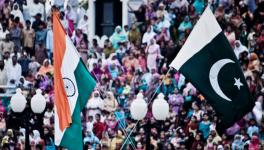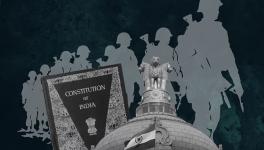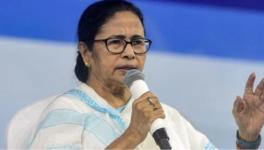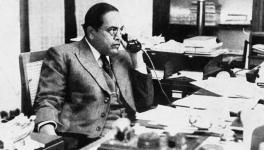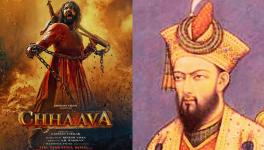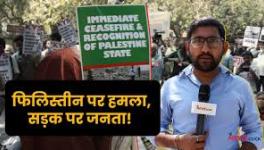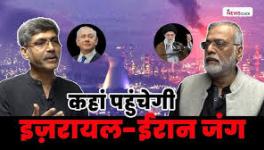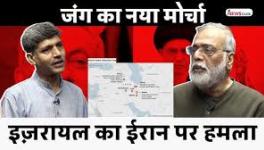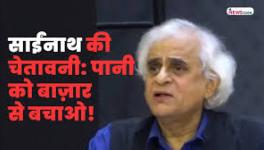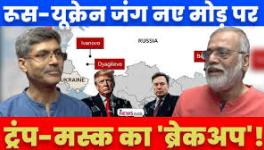Shyam Shrestha - "A very progressive Constitution in the offing in Nepal"
First installment of a series of interviews on the political situation in Nepal presently.
I interviewed Shyam Shrestha, a leading left intellectual in Nepal and who was formerly the editor of the magazine published in Nepali, Mulyankan. The interview features his views on the current political situation in Nepal and was conducted on 13th September 2011. This interview was made possible thanks to a grant from the Appan Menon Memorial Trust.
Srinivasan Ramani: After the failure of the first iteration of the Maoist government, this is the second iteration of the Maoist government in power, but without the Communist Party of Nepal (Unified Marxist-Leninist) which was part of the first government. Do you think this is going to be a stable arrangement?
Shyam Shrestha: It depends upon the Maoists and particularly on United Democratic Madhesi Front which is their coalition partner. The Madhesi Front is not ideologically cohesive. Politically it does not subscribe to any progressive ideology and the major concern of the Madhesi Front is Madhesi issues alone and that of ministerial posts and positions.
The posts and positions that the Maoists have provided have been satisfactory for them and the Maoists have offered them positions that other parties [the Nepali Congress and the UML] would not have. So in that sense, this alliance will go ahead but they are also heavily influenced by international actors, partners like the Indian establishment. If India pressurizes them not to support Maoists at any point of time, they will withdraw their support. That possibility is already there and also if the demands in the four point agreement are not fulfilled by the Maoists, then in that situation also they can withdraw their support. The posts and positions they are getting now... if more than that is offered by the Congress or UML, they could possibly withdraw their support.
But it is also true that this government cannot be a stronger government as it was before during the first government following the CA elections under chairman Prachanda's prime ministership. At that time more than ¾th (three fourth) of Parliament had stood by the Prachanda headed and Maoist led coalition government. This time, the crucial issue will be [the continuation of] Madhesi support. But if Maoists can make some kind of alliance with Nepali Congress and the UML in the near future, then withdrawal of the Madhesi will not matter much. So it depends upon the Maoists' initiative as well; whether they will manage to get the UML and/or the NC on board or not.
SR: Some people have pointed out that this is an unnatural alliance between the Madhesi front and the Maoists, but the point remains that both these parties, fronts in coalition agree on one point – the issue of state restructuring. Do the Madhesis believe that they can get this agenda concluded if they go along with other parties as well?
SS: You know one thing is very clear. On the issues that form the core agenda of the Madhesis – their demands can be fulfilled more by the Maoists than by any other parties. So on the basis of agenda.. on political agenda.. the Maoists are the closest political force to them. No other political party has made demands to plain dwellers in Nepal. Besides the issue of integrating Madhesis in the Nepali Army is being addressed only by the Maoists. In that sense, this alliance is most natural. But it is unnatural in the sense that the Madhesi Morcha [Front] was supporting the Congress and the UML in the past. They were heavily influenced by the Indian government in the past. This time they departed from their former attitude in that sense and ..you can call it somewhat unnatural. But considering political agenda alone, we cannot say that it is unnatural.
SR: It also seems that there is a lot of pressure on the Madhesi leaders from the Madhesi public. Next question I would asked you is last year you had argued that Maoists have shown sincerity in implementing the aspects of components of peace accord. Integration of PLA, Nepal Army, democratization, return of seized property and other things. It seems that first steps taken by Dr. Bhattarai government, they are moving in that direction. The problem is the reaction from NC and UML that's been very negative and also very cautious. So what do you think will happen?
SS: A very amazing contradiction is there. Actually in the past, the Nepali Congress and the UML were telling that Maoists should agree with the modality proposed by the army. They were telling that the number of those to be integrated from the Peoples' Liberation Army [of the Maoists] should be less. The Congress had come around to the number of 6000. UML had come around to the number of 7000 and they were emphasizing that a directorate had to be formed by taking some people from Maoist army, some people from the Nepal army, some from the armed police force..and in that the leadership should be from the army. That was the demand from the Congress and the UML. This time, Maoists agreed, giving their okay to the Nepal army's leadership.
The Maoists are also willing to come around to a number close to 8000 for integration. And on the issue of rank of those integrated, the Maoists seem to have come down from their insistence on having some “major generals” to accepting the highest rank of “colonel” for some of their commanders. This is a demand that the NC had floated and the Maoists seem to have accepted. The UML had been telling that the keys to the containers holding arms and ammunition owned by the PLA should be handed over to the special committee on integration and rehabilitation. The Maoists were long very reluctant to do this, but they have readily done that now after their government was formed. So, almost close to 90% of the demands on integration and that related to the PLA have been accepted by the Maoists – i.e. by the Dr. Baburam Bhattarai led government.
In essence, there is quite a narrowing down of issues between these parties. And the current impasse in that sense, is not quite one based on issues. One tends to ask now as to who would benefit out of the integration process and the conclusion of the peace process? If the integration process is successful under the leadership of Baburam Bhattarai, all the credit for this will go to the Maoists and their popularity will be enhanced. And in any prospective elections, that will translate into more seats for them. So, it is this calculation that is driving the continued lack of consensus. There are sections in the UML and the NC which want the Baburam Bhattarai government to be unsuccessful. In fact, it seems quite clear that even if the government addresses 100% of the demands made by the NC and the UML, the opposition will continue to raise new demands.
SR: What do you think is the public reaction to this political situation now?
SS: Public reaction is that you know...among the general public, over 90% have supported Baburam Bhattarai. People are thinking that the Nepali Congress and the UML are silly. The Maoists fulfilled their demands. Now they are creating havoc again. They are the spoiler of the peace process. This mentality has been there in the people. If they do not change their attitude, more and more people will be against Congress and UML. So this attitude is there. Even the civil society people like Prof. Lokraj Baral, who was supporting Nepali Congress before, voting Nepal Congress before, they are writing in the press that whatever Maoists are fulfilling...they are very good. They ask the NC and the UML.. Why do you disrupt the peace process by putting in new demands. Even CK Lal, the “bourgeois” writer.. he is supporting them. So public opinion is totally against Congress and UML now because they are creating “non issue” issues. Their concerns are not genuine issues. They are disturbing peace process here and in the constituent assembly they are saying that so long as peace process is not completed, they will not allow constitution writing. So they are disrupting the writing of the constitution apart from disrupting the peace process as well. The people of Nepal are very very conscious. They can analyze what is going on. So if the opposition continues this attitude, they could well be defeated badly in any forthcoming election.
SR: But at the same time there is a contradiction among the Maoists also. The more and more concessions the Baburam Bhattarai government with the support of Chairman Prachand are able to put forward, the puritan (if we can use the word) faction within the party has reacted to these with protests. For e.g. when keys of arms' containers were handed over to the special committee, there were protests.
SS: The rumours that are being put in the Nepali press and what is actually happening inside the Maoist party is quite different. In my my analysis, the issues put by the Mohan Baidya led faction is not that army should not be integrated. They agree that their army should be integrated and it should be drawn within the time frame...On that issue they is no disagreement. They also do not disagree that the issues of seized property that should be returned back. But their point was that that the seized land which belonged to absentee landlords had already been distributed to the tillers. That land can not be got back. That is also a provision of land reform in the CPA. They are saying that the land seized from absentee landlords and other such exploiters should not be returned back. All other land can be given back. This stand should be taken by the Maoists.
On the army integration issue as well, a section among the Maoists believe that, first of all, modality, number and rank should be settled first and only then should the keys of the containers handed over. This section believes that there is a sequencing problem and concessions can't be made until major issues are resolved. This should have been properly reported by the press.
In my analysis, if the Nepali Congress and and UML accept proposals made by the Maoists in a “package basis” right now, there will be no quarrel within the Maoists. This quarrel is not baseless. There is some validity in the point that army integration should not be done in a humiliating way but in a respectful way. That is their demand. Some of the comrades among the Mohan Baidya faction are very hardline as well - they are of the view that the constitution is not possible to be written by the current set of the polity in the CA. But such views are expressed by a minor number in the faction. Mohan Baidya as such does not agree with that view. He believes that the Constitution should be written by this CA, that the army should be integrated but that should be drawn out and concessions should be written in a progressive way. That is their demand.
SR: You had also talked about the need for setting up a truth and reconciliation commission. Among the four point agreement, there is a provision that some of the cases pending from the peoples' war days and the Madhesi agitations will be withdrawn. Do you support that provision or is it in tune with the idea of truth and reconciliation commission?
SS: This issue is indeed problematic. The Truth and Reconciliation Commission was supposed to be formed in fifteen days by the Dr Bhattarai led government as part of the “Rahat” package. They have declared that within fifteen days there will be a law passed by the parliament and after law is passed this commission will be formed. The commission for disappeared people also will be formed. That has been declared by the government publicly. So that is very good. That should have been formed three years ago. It was not formed and thankfully the Dr Bhattarai led government is going to form that.
Several cases were framed against Maoist leaders, many of them political against chairman Prachanda, Baburam Bhattarai for example. When the civil war was concluded, it was written in the peace agreement that these political cases will be withdrawn. And indeed they should have been withdrawn. This agreement was part of the interim constitution as well. Therefore there was constitutional legitimacy for withdrawal of politically motivated cases.
Yet, there were also criminal cases lodged against the Maoists, as also against those in the army, in a ratio of 1:4 according to the Human Rights Commission here. In my opinion, these cases should not be withdrawn and the process of justice must take its own course. That is the point I would like to make.
As it is elsewhere, in the political cases, whenever there is a peace agreement after a phase of conflict, there come in provisions of amnesty. After the civil war and the republican revolution, these cases had to be withdrawn and those against the Maoists were part of this provision of amnesty. But the criminal cases featuring the killing of common people is a different issue altogether.
SR: You briefly mentioned the role of India. It was very clear that past two three years, two years actually in fact, after Chairman Prachanda resigned the Indians have been trying to isolate the Maoists. They push them into isolation and this multi-party alliance was formed with the leadership of UML leader Madhav Nepal that later on fell apart. During this period, the role of the (former) Indian ambassador Rakesh Sood also came under scrutiny. Many reports suggested that he was deeply unpopular among the Nepali polity and political establishment. Since then, do you think there is shift in stance of the Indian establishment now after the formation of this new government?
SS: I would say that there was a little bit of a shift. If there was no shift, Baburam Bhattarai government was not possible, in my reckoning. It would not have been possible under the support of the Madhesis. It is indeed a little bit of a shift. But the way Indian government is handling Indo-Nepal relationship, I think that has been quite a failure and is quite unpopular here. That is a bit of an anti Indian government sentiment because they are not treating us as equals. We are not a colony of India. We are equal and we need to be treated equally. We respect the Indian people. We love the Indian people. There is no quarrel with the Indian people and we respect them also. But the way Indian government has treated the Nepali government in the past is as if the we are their servants.
There have been instances when Indian Ambassadors have scolded our Prime Minister. If I was the Prime Minister I would have made him to return his country immediately. The Nepali governments in the past have not shown such courage. There has also been too much interference by the Indian establishment. This intervention was spoiling our peace process, our constitution making process and even our government formation processes. That is the general public opinion in Nepal.
During the tenure of Shyam Saran [former ambassador], Indo-Nepal relationship was far better. Even during the tenure of Shiv Shankar Mukherjee, it was good. They had also indulged in interference , but the nature and the interference was much lesser. But during Rakesh Sood's tenure, the impression he created was that of being a ruler of Nepal, that our prime minister was akin to a chief minister of an Indian state. That kind of attitude could not be digested by the Nepali people who are very politically aware.
From what I read in the Indian press, the attitude of the Indian establishment is being questioned there as well. Prominent intellectual S.D.Muni has written that that Indian government's attitude is akin to that of a big brother and reminiscent of the British Raj. Certainly this attitude must change. The Indian establishment should introspect about the fact that their relations with most neighbours are not encouraging, except for Bhutan. Something points out to the foreign policy with their neighbours to be a failure and I think the Indian establishment should review their foreign policy duly. I do think that there is indeed a review and attempts at a rethink, but it is a slow process. I also reiterate that there seems to be a slight shift in their position vis-a-vis the Nepali political process now.
SR: I would like to ask you about the Constitution writing processes now. From all indications, the way that debate has progressed on the modalities of the constitution, it seems that it is inevitable that state restructuring is going to happen. It is inevitable that more power is to be decentralised to the federations. There has been talk of six or eight provinces. But the structure of the federation is still a matter of debate. As for the structure of government, it seems that the polity is coming around to a French model of government with both an executive presidency and a prime minister accountable to parliament. Do you accept this assessment.
SS: You know, several thematic committees consisting of members of var ious political parties have proposed various reports in the Constituent Assembly. If you read that reports...if these reports are incorporated well in the new constitution, I think, the constitution of Nepal will be very progressive ...even more than the Indian constitution! In the sense that in Nepal, every citizen would have the right to work, right to employment and there will be unemployment benefits also for those who are unemployed. That right is not there in Indian constitution. There will be right to primary health, right to housing ... and the people that are old, children, those who are physically handicapped, all will have social security from the state. They will be covered..they will be protected by the state.
Right to education will be guaranteed and till twelfth class [high school], it will be free. Right to environment is also to be there. Men and women will have equal property rights – in household property, inherited property etc. Men and women shall be treated as equal. If the President is a man, the Vice President will be a woman. If the Premier will be a male, the Vice Premier will be a female. That arrangement is also there in the constitution. That is not there in the Indian constitution. Women will be represented at least to the tune of 33% and could also be represented to the range of 50%, that provision is there in the Constitution. Reservations will be mandated for dalits – 13 + 5%. The ethnic people and minorities will also be proportionally represented in government, in administration, in the army.
As for state restructuring, our federal structure is envisaged to be quite different from that of India, for example. The centre would be strong, but much more powers will be decentralised to the provinces. Nepal's new provinces will have more powers in comparison to the provinces in the Indian federal structure – with respect to autonomy, taxes, right to resources, etc.
The French model of government seems to be a result of compromise with the NC and the UML. The NC has been favouring a parliamentary system with a prime ministerial head, while the UML has asked for a directly elected prime minister. The Maoists have been proposing a presidential system of governance and the French model is a compromise arrived at, after reconciling these positions.
I do not think that the dual centres of power as seen in the French model is ideal for Nepal. Conflict between dual centres of power – between the prime minister and the monarch has been a feature of Nepal's politics for long. I do not think it will be stable arrangement to have both an elected president and a prime minister responsible to parliament for this reason. Even recently, the difference of opinion between the president and former prime minister Prachanda had created a constitutional problem. One has to keep that in mind. Other than that, I do believe that what is being envisaged as part of the Constitution by the various thematic committees in the CA, is going to bring about a very progressive Constitution, even better than that of India.
SR: Is there a broad agreement among all the parties on this themes?
SS: Yes, there is more or less a broad agreement.
Get the latest reports & analysis with people's perspective on Protests, movements & deep analytical videos, discussions of the current affairs in your Telegram app. Subscribe to NewsClick's Telegram channel & get Real-Time updates on stories, as they get published on our website.










